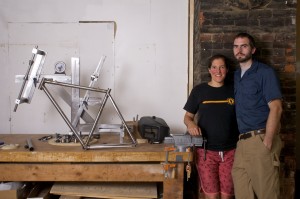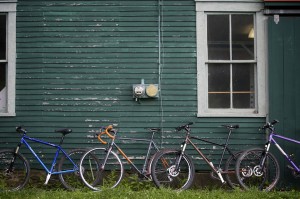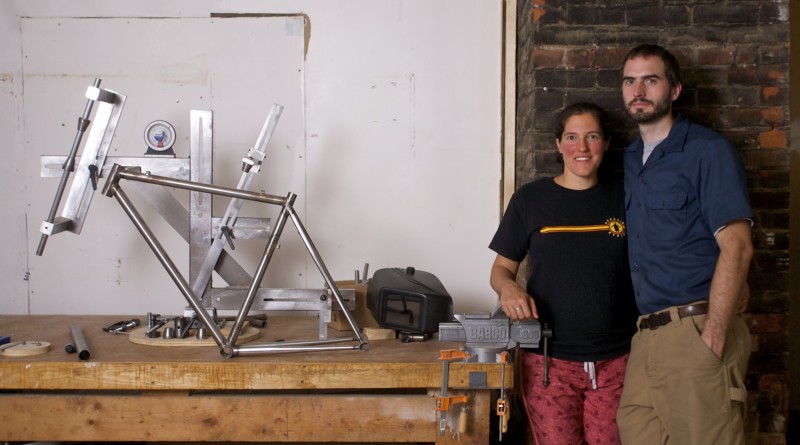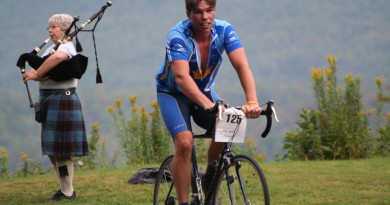Purpose Built | Brownsville’s Penguin Cycles Makes Custom Bikes With Two Things in Mind: The Rider and the Terrain
It’s easy to walk into a bike shop and walk out with a new bike. But if you’re ready for something more customized to your riding style and biomechanics, Penguin Cycles in Brownsville is an interesting option. Located in an old cheese factory at the foot of Mount Ascutney, which doubles as the home of husband and wife Eric Krivitzky and Raina White, Penguin Cycles churns out steel-frame bikes that ride as nicely as they look.

Krivitzky and White have the technical background and passion for cycling to make top-of-the-line bikes. Both have engineering backgrounds, and they’re both serious riders. Krivitszky races as a Cat 4 and does some cyclocross; White is a certified personal trainer and teaches spinning classes.
The journey to a custom Penguin Cycles bike begins with a long interview between the rider and Eric and Raina. They talk about the customer’s riding preferences (duration of rides and terrain), bike preferences (stiffness versus comfort) and budget (very light frames can cost more than heavier ones). Then they run the customer through a battery of measurements and tests. They measure things like height, sternum height, femur length, arm length, shoulder width, and even shoe size: each plays a role in comfort, handling and efficiency on the bicycle.
Raina also performs a flexibility test, to determine how much leg extension the customer can handle. Sometimes the customer will ride a stationary bike so that Eric and Raina can get a feel for the person’s pedaling style. You can do many of these things through an in-depth questionnaire, or you can visit the shop in person and get a one-to-two-hour consultation. Of course, if you already like the way your bike fits, they can make a new frame with the same specifications.

Once the customer’s measurements and preferences are fleshed out, Eric designs the frame. He picks the diameter of tubing—according to the rider’s weight and budget—and can help you decide on the components. Depending on your aesthetics and needs, you can choose to have the cables routed inside the tubes, and you can ask for braze-ons for bike racks and fenders. When the details are set, Eric goes to the computer, where he uses a bike-specific computer-aided design package to depict all the angles and lengths of the frame.
With the specifications finalized, Eric creates a packet with all the dimensions and jig measurements, and then begins cutting the tubes to size. The tubes are steel alloy—the same type of light and strong metal used to build small airplane fuselages—and are made by Columbus or True Temper. The frames usually end up weighing 3.5 to 4.5 pounds. When the tubes are cut, he files the ends so that they can fit together smoothly; a frame jig that can be adjusted to a variety of angles and lengths helps with this. With the pieces on the jig, Eric tack-welds them together one by one, so that they stay in place for the true welding, which is the real art of frame building. Holding the steel welding material next to the joint, he melts it into little puddles that look like a stack of shiny dimes offset from each other. Each one should be circular and evenly spaced, and the goal is perfection.
Once the frame is welded together and Eric tests it for straightness, they send it off to one of two frame painters in Oregon or Colorado. For the base price of $1,275, you can get a basic frame wet-painted in two colors. Pay a little extra, and your bike can have a more durable powder-coat, which can’t really chip because the paint is ionized to the steel. A complete bike, fitted with all the components and ready to ride, will run you about $2,500 to $4,500.
Eric and Raina chose to name their bike business after a flightless bird because, according to Eric, the penguin is purpose built. “A penguin has a roll of fat to protect its eggs and wings not for flying, but for swimming. Nothing on a penguin is superfluous or flashy,” he says. The same holds true for their bicycles.


